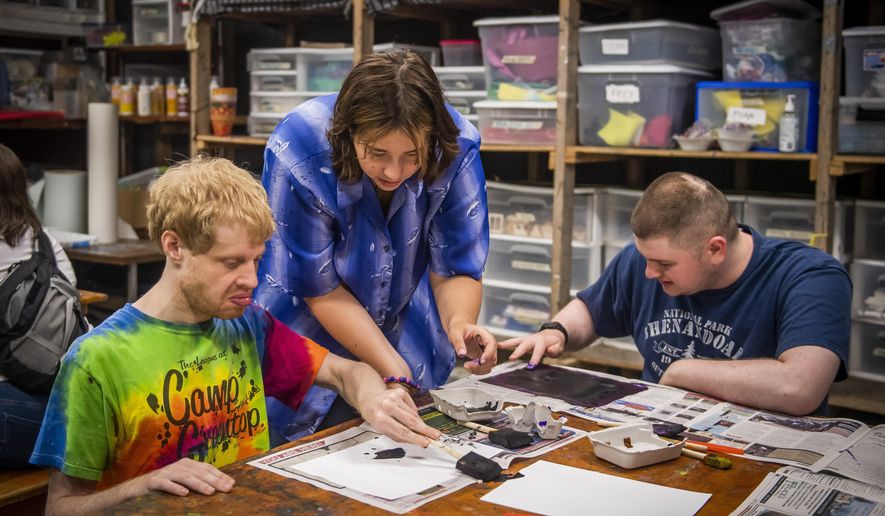SABILLASVILLE, Md. (AP) — In the depths of Catoctin Mountain Park, a mile from Camp David, 19-year-old Melita Bell was overwhelmed. She had been working at Camp Greentop, a summer camp for people with disabilities, for just a week and didn’t think she could keep going.
“I was like, ‘I’m gonna quit. I can’t do this. This is outside of my comfort zone. … I don’t know if I’m even making a difference with these campers,’ ” Bell said.
The second week, a switch flipped in her mind. She grew to love what she was doing.
Bell came back to camp year after year until she began working full-time at the camp’s parent organization, The League for People with Disabilities, in 2013.
She didn’t feel like she had any forward momentum in the organization, Bell said. She decided to take a job as director for different camps in 2016.
But Bell found it difficult to work with neurotypical children. She missed working at Camp Greentop.
“It’s more physical and harder, because we have campers who have a lot of personal care needs and things like that, but I just got more joy out of it,” Bell said.
In 2018, she said “the stars aligned” and she rejoined The League as the director of camping and recreation. Bell said she has a unique perspective in the role, having worked at multiple levels in The League.
The League created the camp in 1937. The League provides support for those who have disabilities for ages 6 and up, according to CEO and President David Greenberg.
He began his career as a registered nurse, working in pediatric rehabilitation. His work at The League allowed him to work with children beyond just treating their physical condition.
“They’re not (at the league) for their condition. They’re here to have fun, they’re here to find a job, they’re here to socialize, to find other people to connect with,” he said.
The League supports people with intellectual and physical disabilities, whether they are developmental or acquired.
Greentop is split into six sessions, each about a week long. Two are for adults (18-plus) only, two are just for ages 7 to 21, and two are for all ages.
Because of COVID-19, the camp ran very differently the last two years. In 2020, there were virtual options and an option for the whole family to attend camp together. In 2021, the only in-person sessions were in July.
This year, the camp could open to at least half of its pre-COVID capacity. It took precautions, including mandatory vaccination and testing upon arrival.
Ensuring safety was extremely important. Greenberg said many of the campers can be on up to 25 different medications. There are two trained nurses on site to help provide care.
The adult-only sessions are relatively unstructured, allowing campers to do whichever activity appeals to them, Bell said.
They can work on art projects, or choose to have relaxation time, where they can lie on beanbags or sit in a chair and watch movies. Other options include nightly campfires, going to the pool, playing sports, or day trips to cinemas, arcades, or casinos, according to Bell.
Other sessions are much more structured. Campers cycle between different activities around camp in 45-minute sessions, Bell said.
“Some of our campers, when they have that free time, it kind of gets them into trouble,” she said.
Counselors also make sure to “put ability first,” Bell said.
They create ways for every camper to participate in an activity. If a camper can’t use their hands, they can use their mouth to paint during arts and crafts. If a camper is in a wheelchair, they can be a referee or a goalie in soccer games.
Counselors get a 10-day-long orientation before camp starts. They get to know how to take care of people with disabilities, and they can meet the parents of those children.
Having the camp, where parents can trust that their children will be taken care of, can be life-changing, according to Bell.
It can save marriages and allow other kids in the family to get attention, she said.
“Being able to have their kids at this program, it’s a week for them as parents to reconnect. They go on vacations. They’re able to kind of focus on themselves and their marriage a bit more,” she said.




Please read our comment policy before commenting.